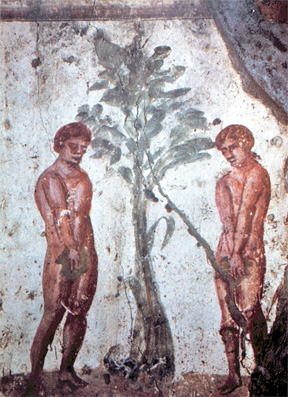Though acknowledging that we might choose one of several valid starting points when seeking a biblical, Christian perspective on illegal immigration, I would argue for the precedence of two. These two starting points get us looking in the right direction and help us see more clearly how other biblical truths inform the issue of immigration and undocumented workers.
Genesis 1
The first starting point is the first chapter of Genesis. Here we find one of two distinct but complimentary stories of creation. Here we start to learn who we are as human beings and what God intends for us, Genesis is a fine starting point for our conversation of illegal immigration, not only because it is the literal beginning of the Bible, but also because it begins to reveal the mind of God concerning the nature and purpose of human life.
In Genesis 1, God creates the heavens, the earth, light, darkness, the sky, the waters, the seas, the dry land, vegetation, the sun, the moon, the fish, the birds, and the rest of the animals (1:1-25). Then God creates human beings: “So God created humankind in his image, in the image of God he created them; male and female he created them” (1:27). After blessing the first humans, God said to them, “Be fruitful and multiply, and fill the earth and subdue it; and have dominion . . .” (1:28). Having created human beings, God observes his whole creation and sees that it is “very good” (1:31). (Photo: Adam and Eve, from the Catacombs of Saints Marcellinus and Peter.)
 What in this account of creation informs our thinking about illegal immigration? First, we learn that human beings are created in the image of God. Nothing else in the universe bears the divine image. As you might imagine, theologians differ on exactly what this image entails. Some point to rationality. Others emphasize moral judgment. Still others see God’s image as that which authorizes human beings to manage God’s creation. In spite of disagreeing about the precise nature of God’s image, virtually all theologians agree that it sets humanity apart as a unique element of creation.
What in this account of creation informs our thinking about illegal immigration? First, we learn that human beings are created in the image of God. Nothing else in the universe bears the divine image. As you might imagine, theologians differ on exactly what this image entails. Some point to rationality. Others emphasize moral judgment. Still others see God’s image as that which authorizes human beings to manage God’s creation. In spite of disagreeing about the precise nature of God’s image, virtually all theologians agree that it sets humanity apart as a unique element of creation.
Moreover, the fact that humankind bears God’s image reveals the sacredness and dignity of each and every human life. Every single person, without regard to gender, race, capability, appearance, popularity, citizenship, or accomplishment, reflects God’s own image and is, therefore, sacred and worthy of respect and honor. Just as it would be foolish to treat God with contempt, so it is in our regard for and relationship with each human being.
If all human beings bear the image of God and therefore are to be treated with dignity, then this surely includes those who are in the United States illegally. So called “illegal aliens” are, first and foremost, sacred beings created in God’s own image. Thus they, like all of humanity, should be regarded as sacred and treated with respect.
This does not necessarily require any particular solution to the problem of undocumented workers in the United States, however. After all, criminals are also divine image beavers and deserve respectful treatment even in their incarceration. So it is possible for someone to accept the sanctity of each human life and, at the same time, to believe that illegal immigrants should not be allowed to remain in this country. But if we think of those who are in the USA illegally as sacred beings, this will surely affect how we think about our treatment of them as a nation.
As listen to the debate about this issue, I am concerned that many people, including many Christians, talk about undocumented workers and their families as if they were something other than precious human beings created in the image of God. It seems, sometimes, that people speak of illegal aliens as if they were almost less than human. What defines these human beings, fundamentally, is their illegal status. Surely this kind of rhetoric, and the attitude it reflects, is inconsistent with a biblical understanding of human life.
Of course it is also true that all people impacted by the problem of illegal immigration need to afforded respect as sacred creatures. This includes, for example, ranchers whose lives are endangered by a porous border between the United States and Mexico, unemployed American citizens whose opportunities for work are limited because of undocumented workers, etc. Whatever solutions we propose for the problem of illegal immigration, Christians simply cannot compromise the divinely-created specialness of each human being.
In tomorrow’s post I’ll expand further upon Genesis 1, exploring another implication of this text for illegal immigration.

